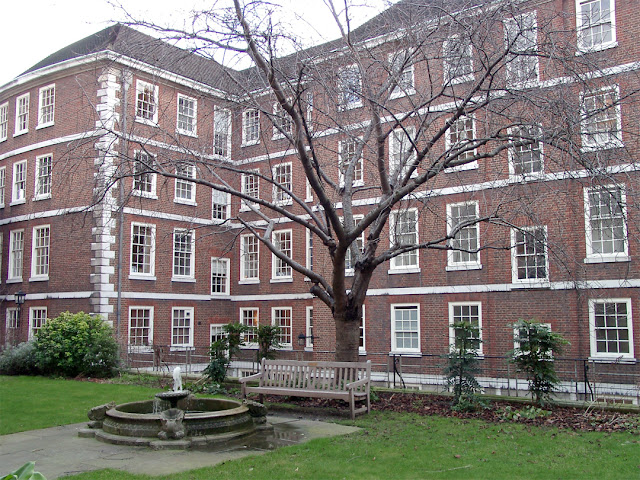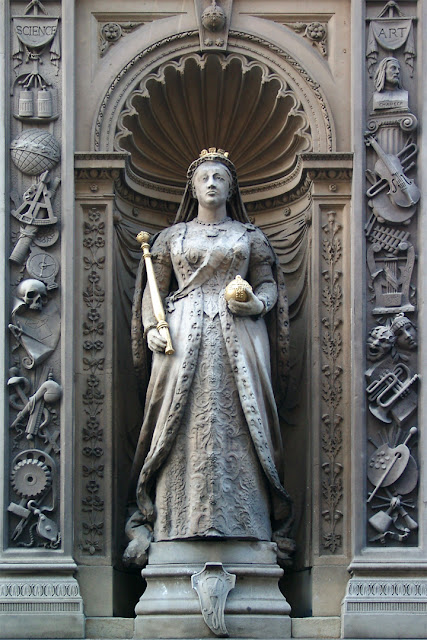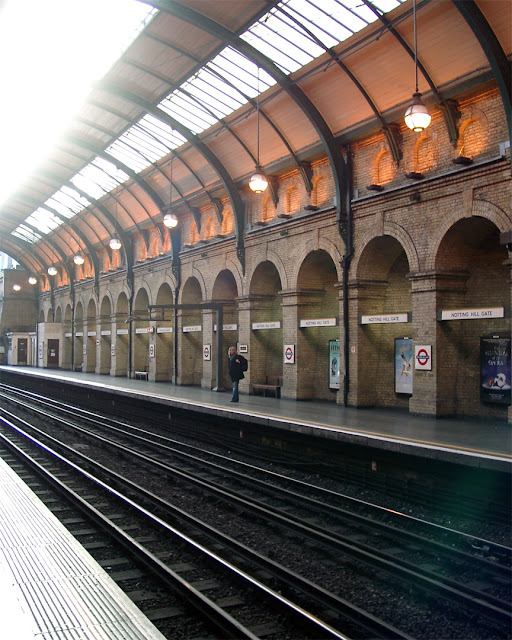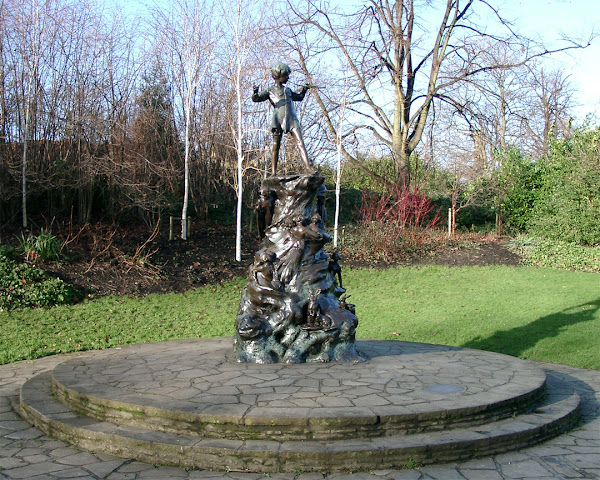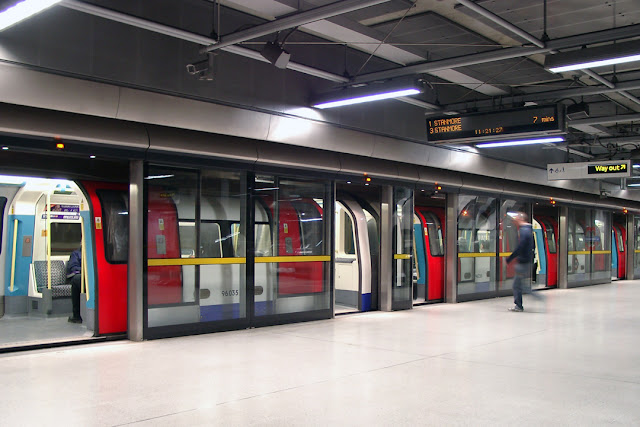Wednesday, November 30, 2005
Tuesday, November 29, 2005
Monday, November 28, 2005
Sunday, November 27, 2005
Saturday, November 26, 2005
Queen Victoria
Queen Victoria by Joseph Boehm, 1880
Temple Bar Memorial
Strand, Holborn
London, January 2005
“Following the removal of Wren's gate, Horace Jones, Architect and Surveyor to the City of London, designed a memorial to mark Temple Bar, which was unveiled in 1880. The Temple Bar Memorial stands in front of the Royal Courts of Justice. The elaborate pedestal in a neo-Renaissance style serves as the base for a sculpture by Charles Bell Birch of a dragon supporter (sometimes erroneously referred to as a griffin) bearing a shield of the arms of the City of London. The pedestal is decorated with statues by Joseph Boehm of Queen Victoria and her son the Prince of Wales, the last royals to have entered the City through Wren's gate, which event is depicted in one of the reliefs which also decorate the structure.” (Temple Bar, Wikipedia)
Friday, November 25, 2005
Notting Hill Gate
Notting Hill Gate tube station
Notting Hill, Kensington
London, January 2005
“Notting Hill Gate is a London Underground station near Notting Hill, London, located on the street called Notting Hill Gate. On the Central line, it is between Holland Park to the west and Queensway to the east. On the District line and Circle line, it is between High Street Kensington and Bayswater stations. It is on the boundary of Travelcard Zone 1 and Zone 2.” (Notting Hill Gate tube station, Wikipedia)
Thursday, November 24, 2005
Wednesday, November 23, 2005
Queen Anne's Alcove
Queen Anne's Alcove
Lancaster Gate
Kensigton Gardens
London, January 2005
“Queen Anne's Alcove, which stands just beside Lancaster Gate, was originally sited against the park wall at Dial Walk, to the south of Kensington Palace. It was made in 1705, by Sir Christopher Wren, for the southern boundary of the queen's formal south garden. Queen Anne's coat of arms can be seen just below the roof. In 1867, Mr. Cowley, a London builder, paid for it to be moved to its present position at his own expense as it was considered unsightly and a resort for undesirable persons. Later, it was used as a gardeners' storeroom.” (Queen Anne's Alcove, The Royal Parks)
Tuesday, November 22, 2005
Peter Pan statue
Peter Pan statue by George Frampton, 1912
Kensington Gardens
London, January 2005
“The statue of Peter Pan is a 1912 bronze sculpture of J. M. Barrie's character Peter Pan. It was commissioned by Barrie and made by Sir George Frampton. The original statue is displayed in Kensington Gardens in London, to the west of The Long Water, close to Barrie's former home on Bayswater Road. Barrie's stories were inspired in part by the gardens: the statue is located at the place where Peter Pan lands in Barrie's 1902 book The Little White Bird after flying out of his nursery. Six other casts made by the original artist have been erected in other locations around the world.” (Peter Pan statue, Wikipedia)
Monday, November 21, 2005
Greylag geese
Greylag geese
The Long Water
Kensington Gardens
London, January 2005
“The greylag goose or graylag goose (Anser anser) is a species of large goose in the waterfowl family Anatidae and the type species of the genus Anser. It has mottled and barred grey and white plumage and an orange beak and pink legs. A large bird, it measures between 74 and 91 centimetres (29 and 36 in) in length, with an average weight of 3.3 kilograms (7.3 lb). Its distribution is widespread, with birds from the north of its range in Europe and Asia migrating southwards to spend the winter in warmer places. It is the type species of the genus Anser and is the ancestor of the domestic goose, having been domesticated at least as early as 1360 BC. The genus name is from anser, the Latin for ‘goose’. Greylag geese travel to their northerly breeding grounds in spring, nesting on moorlands, in marshes, around lakes and on coastal islands. They normally mate for life and nest on the ground among vegetation. A clutch of three to five eggs is laid; the female incubates the eggs and both parents defend and rear the young. The birds stay together as a family group, migrating southwards in autumn as part of a flock, and separating the following year. During the winter they occupy semi-aquatic habitats, estuaries, marshes and flooded fields, feeding on grass and often consuming agricultural crops. Some populations, such as those in southern England and in urban areas across the species' range, are primarily resident and occupy the same area year-round.” (Greylag goose, Wikipedia)
Sunday, November 20, 2005
Queen Caroline's Temple
Queen Caroline's Temple
Kensigton Gardens
London, January 2005
“Queen Caroline's Temple is a classical style summer house overlooking the Long Water, east of Lancaster Walk. It was designed for Queen Caroline, for whom the Long Water was created, in 1734-5 and is attributed to William Kent. Some of the graffiti inside the temple dates back to 1821 when the park was first open every day to visitors. It was converted into a park keeper's home, but restored in 1976.” (Queen Caroline's Temple, The Royal Parks)
Saturday, November 19, 2005
Friday, November 18, 2005
City Hall & Slipstream
City Hall
Slipstream by Fiona Banner, 2003
More London Riverside
The Queen's Walk
South Bank, Southwark
London, January 2005
Thursday, November 17, 2005
Wednesday, November 16, 2005
Tuesday, November 15, 2005
Monday, November 14, 2005
Sunday, November 13, 2005
25 Bank Street
25 Bank Street, 2003
Canary Wharf, Docklands
Tower Hamlets
London, January 2005
“25 Bank Street is an office tower in Canary Wharf, in the Docklands area of London. It is currently home to the European headquarters of the investment bank JPMorgan Chase. The building was developed in 2001–2003 by Canary Wharf Group as one of five new buildings on its Heron Quays site. The building was designed by architects Cesar Pelli & Associates Architects and built by Canary Wharf Contractors. Before construction, 25 Bank Street had been earmarked by Canary Wharf Group for occupation by Enron's European subsidiary. This plan was abandoned in 2001, prior to Enron's collapse later that year. From 2004, 25 Bank Street served as the European headquarters of Lehman Brothers until the bank's insolvency in September 2008.” (25 Bank Street, Wikipedia)
Saturday, November 12, 2005
Friday, November 11, 2005
Thursday, November 10, 2005
Wednesday, November 9, 2005
Tuesday, November 8, 2005
Monday, November 7, 2005
Sunday, November 6, 2005
One Churchill Place
One Churchill Place, 2004
Churchill Place
Canary Wharf
London, January 2005
“One Churchill Place is a 156 m tall skyscraper with 32 floors, serving as the headquarters of Barclays Bank. It is in the Docklands area of London Borough of Tower Hamlets in Canary Wharf. The building is the 13th-tallest office block in the United Kingdom and the sixth tallest building in the Docklands. The building was formally opened in June 2005 by the Chairman of Barclays, Matthew Barrett, and merged Barclays offices across London into one building. The former corporate HQ was at 54 Lombard Street in the City of London. Barclays occupy approximately 90% of the building; floors 18-20 are leased to BGC Partners/Cantor Fitzgerald.” (One Churchill Place, Wikipedia)
Saturday, November 5, 2005
Glass canopy
Curved glass canopy over the entrance
Canary Wharf tube station
London, January 2005
“Above ground there is little sign of the vast interior: two curved glass canopies at the east and west ends of the station cover the entrances and allow daylight into the ticket hall below. The Jubilee Park, a public park is situated between the two canopies, above the station concourse. It had originally been intended that the infilled section of the dock would be reinstated above the station, but this proved impractical because of technical difficulties and the park was created instead.” (Canary Wharf tube station, Wikipedia)
Friday, November 4, 2005
Thursday, November 3, 2005
Surrey Quays Shopping Centre
Surrey Quays Shopping Centre
Redriff Road, Rotherhithe
London, January 2005
“Surrey Quays Shopping & Leisure is located in Rotherhithe, London. It is currently owned by British Land. The shopping centre opened in July 1988 following years of development by the London Docklands Development Corporation in the London Docklands and surrounding areas. Surrey Quays Shopping has over 40 stores including Tesco, 1,300 parking spaces and a food court. Improvements in the local transport links and rise in local housing developments in recent years have given local consumers easier access to the retail area. In August 2019 British Land announced plans to demolish the shopping centre to make way for new stores, green spaces and housing. These plans were approved in October 2019. Works are due to start in 2022.” (Surrey Quays Shopping Centre, Wikipedia)
Wednesday, November 2, 2005
The Deal Porters
The Deal Porters by Phillip Bews and Diane Gorvin
Canada Water
London, January 2005
“The deal porters were a specialist group of workers in London's docks. They handled baulks of softwood or "deal", stacking them up to 60 feet (18 m) high in quayside warehouses. This was a demanding and dangerous job. It required physical strength, dexterity and a head for heights, to such an extent that they were nicknamed ‘Blondins’ after the famous acrobat, Charles Blondin. Deal porters wore special leather headgear (backing hats) with long ‘aprons’ over their shoulders in order to protect their heads and necks from wooden splinters.” (Deal porter, Wikipedia)
Tuesday, November 1, 2005
Canada Water bus station
Canada Water bus and metro stations
Rotherhithe
London, January 2005
“Canada Water bus station serves the Surrey Quays area of the London Borough of Southwark, London, England. The station is owned and maintained by Transport for London. The bus station was opened on 18 September 1999 at the same time as the Jubilee line extension to Stratford reached Canada Water and is accessible by escalator from Canada Water station below easily. It is very near to Surrey Quays Shopping Centre. There is one alighting stand and four boarding stands within the bus station. The glass-roofed bus station was designed by Eva Jiřičná. It is a hub for services in the Rotherhithe and Bermondsey areas as well as an interchange for the tube station. Its most distinctive feature is a row of 16 m (52 ft)-long roof spans cantilevered from a row of central columns supporting a 100 m (330 ft)-long glass and aluminium canopy. This provides acoustic protection to the surrounding residential blocks and shelters passengers waiting below from the elements.” (Canada Water bus station, Wikipedia)
“Canada Water is a London Underground and London Overground station located in Rotherhithe, in south London, England. It takes its name from Canada Water, a lake which was created from a former dock in the Port of London. The station is located on the Jubilee line between Bermondsey and Canary Wharf stations and on the East London line between Rotherhithe and Surrey Quays stations, and provides an interchange point between the two lines. It is in Travelcard Zone 2. London Overground services commenced on the East London line on 27 April 2010, as the replacement extension of the historic tube line.” (Canada Water station, Wikipedia)
Subscribe to:
Comments (Atom)



